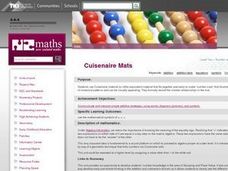Curated OER
Symmetry with Shapes
Students analyze a symmetrical stamp design with an equal balance of light and dark to create a pattern in succession. In this shape design lesson, students review concepts of sign, symbol and language across cultures. Students analyze...
Curated OER
Observational Drawing
Students create drawings using oil pastels that convey cultural, social and historical meaning. Drawings are evaluated on use of color planning, contour drawing, color blending, line and pattern.
Curated OER
Parking Pass
Students look at the rights and laws created to assist individuals with physical disabilities. In this lesson on fair treatment for all, students discuss symbols that related to people with disabilities. They create a new parking...
Curated OER
Warhol and Collaboration
Students view images of Warhol/Basquiat collaboration and discuss them using the questions listed in the lesson. They work in groups to choose a theme or topic relating to American culture and discuss ideas about symbols that could be...
Curated OER
Mural Mania
Learn about your home state. After listening to stories about your state, identifying symbols, and discussing what makes your region special, your class creates a mural.
Curated OER
Review of Literary Devices
Sixth graders review literary devices. They use both fiction and nonfiction texts to review metaphor, simile, alliteration, imagery, symbolism and personification. This instructional activity has a scripted guide for the teacher to follow.
Curated OER
Butterfly Addition: Color by Numbers
Children learning to add numbers up to 11 develop the strategy of using the larger number as the first addend and counting on from there to find a sum. They define addition and review the meaning of the plus (+) symbol. To practice, they...
Curated OER
The Color of Success
Students participate in an activity in which they share with each other what success means to them. They are given bags of crayons and blank sheets of paper and create an image that displays what success means to them. Bags of crayons...
Curated OER
Comparing Numbers to 100
Have your budding math analysts compare numbers up to 100. Here are 2 worksheets that each include 60 problems where learners use the appropriate symbol to determine which number is greater than, less than, or equal. An answer key for...
Curated OER
Close Reading
Eleventh graders read and study Hamlet. Then they are introduced to close reading as a means of understanding what is being read--not only understanding the printed word, but also the nuances and connotations of language as it is used by...
Curated OER
Literary Elements in Of Mice and Men
Ninth graders review an exercise, after reading most of the novel Of Mice and Men by John Steinbeck. They demonstrate a range of literary elements such as conflict, symbolism, setting, and foreshadowing. Students also are able to provide...
Curated OER
The Process of Art Criticism
High schoolers interpret possible meanings of works of art by analyzing how specific works are created and how they relate to historical and cultural contexts
Curated OER
Tapestry in the Middle Ages
Students study the use of tapestry in the daily lives of those living during the Middle Ages. They design and create a weaving of their own detailing artists' use of visual language and symbols throughout history. They write a story that...
Curated OER
Cuisenaire Mats
First graders use Cuisenaire rods to study the mathematical symbols =, <, > for the relationships is equal to, is less than, and is greater than. They use the rods to show visual explanations of common number combinations.
Curated OER
Reading, Writing, and Ordering Numbers
Pupils study place value. Students participate in place value and number relay games, write numbers in words, and discuss how numbers are read. As a class, they discuss the meaning of less than and grater than signs. Pupils use inverse...
Curated OER
It's In Your Pocket
Students examine federal powers. In this U.S. Constitution lesson, students explore the powers of Congress to coin money. Students also study the meaning of the symbols on U.S. coins.
Curated OER
How Do You Read Stock Quotes Online ?
Students explore how to get and interpret stock price data online. They also describe certain aspects of various corporations and know the meanings of important terms involving the stock market.
Curated OER
Lesson 3 How Do You Read Stock Quotes Online ?
Students understand how to get and interpret stock price data online. They describe certain aspects of various corporations and know the meanings of important terms involving the stock market.
Curated OER
Politics and Religion in 17th Century Dutch Art
Seventh graders examine different pieces of Dutch Art. They identify its social and political meanings by using cultural and historical information. They examine maps of the time period as well.
Curated OER
Season Sarcophagus
Students analyze a sarcophagus art and create a similar piece of art. In this sarcophagus art lesson, students investigate possible meanings of the Season Sarcophagus and create a work of art that is similar to the subject or meaning of...
Illustrative Mathematics
Words to Expressions 1
Designed as a follow-up to the lesson plan titled Watch Out for Parenthesis 1, this activity asks young learners to write an equation for the calculation described with words rather than numbers and symbols. The treasure that 5th...
Curated OER
Crossing the Delaware with Historic, Cultural, and Personal Interpretations
Sixth graders discover the importance of information sources by researching the United States History. In this research gathering lesson, 6th graders examine a historical painting of George Washington and analyze what it means,...
Curated OER
"A Sound of Thunder" Vocabulary in Context
Ray Bradbury does it again, providing a story full of symbolism and interest. After your class reads "A Sound of Thunder" and studies the difficult vocabulary, quiz them with this sheet. Example words include aurora, expendable, and...
Curated OER
Is the System Fair?
Students investigate shapes and patterns. In this algebra lesson, students move from concrete to abstract understanding of shapes and concepts. They use variable to identify the unknown.























